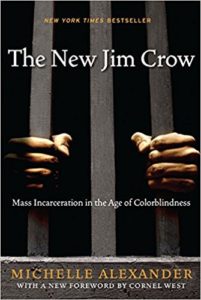 The New Jim Crow: Mass Incarceration in the Age of Colorblindness by Michelle Alexander, Cornel West
The New Jim Crow: Mass Incarceration in the Age of Colorblindness by Michelle Alexander, Cornel West Published by The New Press on January 5, 2010
Genres: Nonfiction
Pages: 312
Format: Paperback
Buy on Amazon
Goodreads

"Jarvious Cotton's great-great-grandfather could not vote as a slave. His great-grandfather was beaten to death by the Klu Klux Klan for attempting to vote. His grandfather was prevented from voting by Klan intimidation; his father was barred by poll taxes and literacy tests. Today, Cotton cannot vote because he, like many black men in the United States, has been labeled a felon and is currently on parole."
As the United States celebrates the nation's "triumph over race" with the election of Barack Obama, the majority of young black men in major American cities are locked behind bars or have been labeled felons for life. Although Jim Crow laws have been wiped off the books, an astounding percentage of the African American community remains trapped in a subordinate status—much like their grandparents before them.
In this incisive critique, former litigator-turned-legal-scholar Michelle Alexander provocatively argues that we have not ended racial caste in America: we have simply redesigned it. Alexander shows that, by targeting black men and decimating communities of color, the U.S. criminal justice system functions as a contemporary system of racial control, even as it formally adheres to the principle of color blindness. The New Jim Crow challenges the civil rights community—and all of us--to place mass incarceration at the forefront of a new movement for racial justice in America.
Every once in a while, you read a book, and you think to yourself, this book is one that everyone, no I mean it, everyone should read. Michelle Alexander’s The New Jim Crow helped me understand race relations in a way no other book I’ve ever read has ever been able to do. In clear, lucid, and at times even poetic prose, Alexander lays out her argument that our War on Drugs has led to a system of mass incarceration that disproportionately punishes black and brown men—in essence, our prison system functions like Jim Crow segregation.
As I read this book, which was published in the middle of Barack Obama’s first term, I kept wondering how Alexander would respond to the unrest that has followed the election of Donald Trump. Does she see a nation picking off the scab and dealing with its racial inequality in response to a morally bankrupt government? Or is is it even worse than Alexander thought? It’s hard to tell when you’re living in the middle of it. In some respects, I see more white people who are willing to take on the role of activist. But white people also voted for Trump in large numbers.
The racial caste system that is mass incarceration will be difficult to dismantle, and I admit to a feeling of defeat as I closed the book. But we can’t give in to despair, no matter how bleak changing the landscape of race relations in America looks right now.
This book changed my mind about a couple of things by making me think about them from a new angle. One: the legalization of marijuana. A couple of years ago, Massachusetts had a ballot referendum on whether or not to legalize marijuana. It’s already decriminalized, as in, it’s legal to have a small amount of marijuana. I confess I voted against legalizing the sale of pot for one reason: I really didn’t think it was at all a good idea for people to use cannabis. I still don’t, really. I am not sure I subscribe to the notion that it’s harmless. However, I am swayed by Alexander’s argument that using cannabis is probably less harmful, especially to others, than drinking and driving. Should cannabis users take to the roads, I’m not sure what the results would be, but I’d prefer it if being sober remains a requirement for keeping your license to drive. I also think some people, not all, do start using other drugs after trying cannabis. Same with alcohol. Not everyone, of course. I have never tried cannabis myself, and I don’t have plans to do so, so I recognize in some ways, I am not really affected by the issue. However, what I now understand is that we have disproportionately thrown the book at African Americans for using the drug (or at least being caught with it) at the same rates as white people, who generally get the slap on the wrist. If decriminalizing marijuana or even making it completely legal and selling it in smoke shops, as Massachusetts is beginning to do, will prevent black and brown people from being incarcerated for minor drug offenses, I’m all for it. Now.
Another issue Alexander raised that gave me pause is the unhelpfulness of colorblindness. I would never say “I don’t see color,” but I am guilty of trying to pretend like race matters less than it does. I am learning. I wasn’t able to see it. I also wasn’t listening to people, and in part, I wasn’t putting myself in the path of the people to whom I needed to listen. I really thought we’d fixed a lot of problems with Obama’s election, and the depressing election of Donald Trump helped me understand we definitely had not. Alexander’s book explains why colorblindness is harmful.
This book has been out for a while, so you’ve probably already read it. However, if you haven’t, you really should. It’s one of the most important books I’ve ever read.